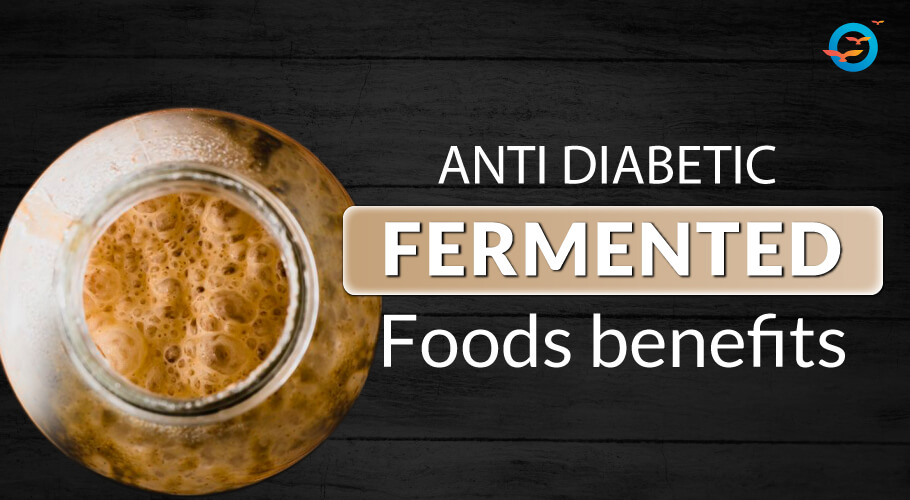How Fermented Foods Help Fight Diabetes

Fermented Foods Benefits in Fighting Against Diabetes
Diets in many South East- and Far East-Asian nations include a variety of fermented foods. Traditionally, fermentation was used as a method to preserve food, and this is one of the chief reasons why fermented foods have become a part of Asian cuisine. In western nations, the rise of refrigerators may be a reason why fermented foods are not as common. But beyond extending shelf life, fermented foods also offer many health benefits, and this is another big reason why fermented dishes are so common in Asian countries.
India, for instance, offers a variety of fermented food dishes as diverse as its multi-cultural composition. From idlis and dosas in the south to lassi in the north, fermented foods are an integral part of the Indian menu.
What is the Process of Fermentation
During fermentation, micro-organisms—these could be bacteria, or yeast, or a type of fungi—act on organic matter, converting sugars and starch into alcohol and acids, which act as natural preservatives. This is also what gives fermented foods their distinctively sour and strong flavors.
The breakdown of sugar and starch also serves to enhance naturally occurring beneficial bacteria, which are known as probiotics or ‘good bacteria. These bacteria are known to be excellent for digestive health. They also address a multitude of other health issues.
Good bacteria are vital for a healthy gut. Not only do they help in the digestive process, but they are also responsible for synthesizing vital vitamins that are key to mental health. This is one of the reasons, Ayurveda puts so much emphasis on a healthy gut. It is not only Eastern healing that stresses gut health, Hippocrates, the father of western medicine, too believed that all disease began in the gut.
Balancing Physical, Mental & Emotional Factors
The enteric nervous system (aka, the hypothalamic-pituitary-adrenal (HPA) axis) links the gut and brain. Basically, the gut lining is chock-full with neurons that have been shown to influence emotion. Serotonin—a neurotransmitter associated with elevation of mood – is produced in the gut, suggesting that in contributing to a healthy gut, probiotic bacteria is also enabling a healthy, emotionally stable mind.
Vitamins and Gut Health
We all know the importance of vitamins for good health. Vitamins are needed for the body to form enzymes that in turn are required by all living cells for biochemical reactions. Unfortunately, the human body is unable to produce many vitamins, and so it depends on microorganisms to do the job. These microorganisms are the probiotic bacteria that are found in the gut, where they synthesize starches and sugars to produce vitamin K and many of the water‐soluble B vitamins, including cobalamin, folates, pyridoxine, riboflavin, and thiamine.
Natural Preservative
Before the advent of refrigeration, the main ways to stop food from spoiling or going bad was by drying or salting or fermentation. Fermented foods being naturally full of organic acids and antimicrobial compounds stop the growth of pathogens that can spoil food, thus extending the life of the food.
Digestion Enhancer
In the process of breaking down sugars and starch, food is pre-digested during the fermentation process. It also improves the bio-availability of essential nutrients by removing certain natural compounds that are known to interfere with the absorption of nutrients. For instance, Phytic acid, found in legumes and seeds, is strongly bound to iron and zinc. This reduces their absorption. Fermentation breaks down phytic acid allowing the minerals to become available.
Immunity Builder
Since 80% of your immune system is linked to the gut, it follows that including fermented foods in one’s diet ensures a healthy gut and a strong immune system. A clear instance of this can be seen in the fact that breastfed babies fall sick less often. This is simply because breast milk is rich in oligosaccharides—aka pre-biotics. The high proportion of these pro-biotics makes breast-milk-fed babies less vulnerable to gastro-infections, as well as, respiratory infections.
Probiotic foods, strengthen the mucosa (gut lining), which forms as a natural barrier and prevents disease-carrying microbes to cause inflammation in the gut wall. The absence of a robust mucosa allows the disease to spread. This is why doctors routinely prescribe pro-biotics along with a course of antibiotics.
Sugar Craving Eliminator
Refined carbohydrates, and sugar act like food for pathogenic (pathogen-carrying) bacteria in the gut. Plus, sugar is not a nutrient, so eating it only creates a nutrient-deficient state. Not just that, eating sugar also leads to sharper cravings. This spiral can be stopped simply by adding fermented foods to your diet. The lactobacillus bacteria eliminate the pathogenic bacteria in your gut and replace them with lactic acid, which acts as food for good bacteria. The elimination of pathogen-carrying bacteria ensures your body doesn’t suffer from cravings for sugar. Result: less desire for sugary foods.
The Diabetes Connection
We all know that diet has a huge impact on causing as well as reversing diabetes. This was brought home by a recent study, conducted in Denmark. The study showed how gut bacteria in diabetics is significantly different from non-diabetics.
The compositional changes in intestinal microbiota are strongly linked to Type 2 diabetes.
The good news is that with a few changes diabetics can do a lot to balance their gut microbiome, simply by regularly consuming fermented foods. While supplements can help, it is better to eschew them in favor of natural sources. Because even a small half-cup serving of fermented food contains 10 trillion
pro-biotic organisms are —100 times higher in probiotics than a supplement!
So, make sure you add this powerful food to your daily diet, in your breakfasts, lunch, and dinner.
For breakfast, switch to dal-based fermented food such as idli, uttapam, or appam. While dosas and medu wadas are also made from fermented ingredients, they are deep-fried; so be circumspect. Barley dosa, millet dosa, brown rice dosa with urad dal, make healthy and nutritious dishes for lunch and dinner.
Join our upcoming Discover Reversal Session on how to reverse your diabetes from Dr. Pramod Tripathi himself then follow the link and proceed to a healthy life.
Disclaimer:
This Blog solely serves our marketing purposes, for Authentic knowledge for this topic, Please join our upcoming Discover Reversal Session.

